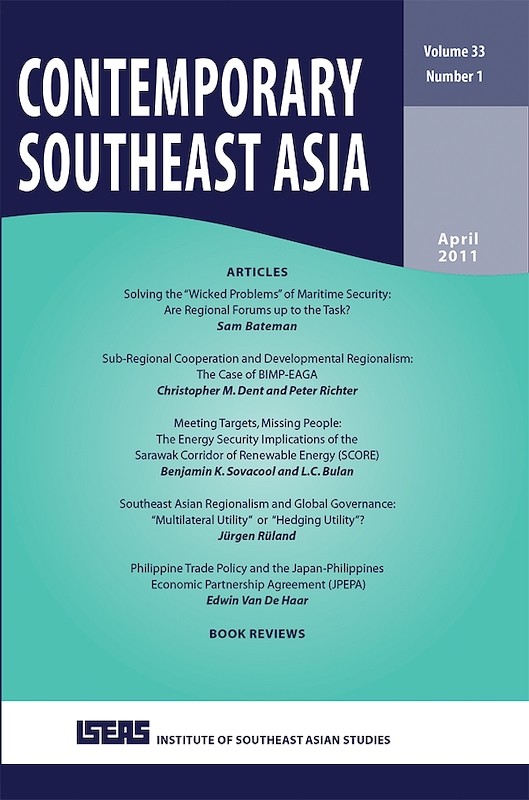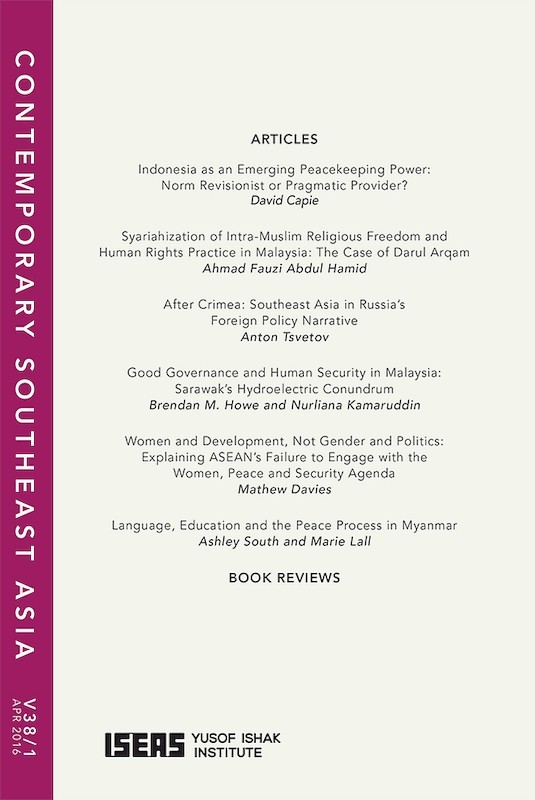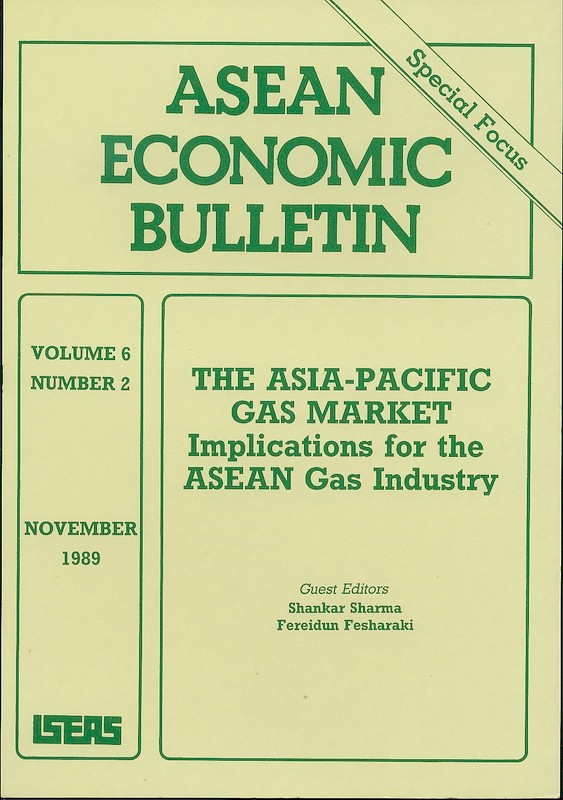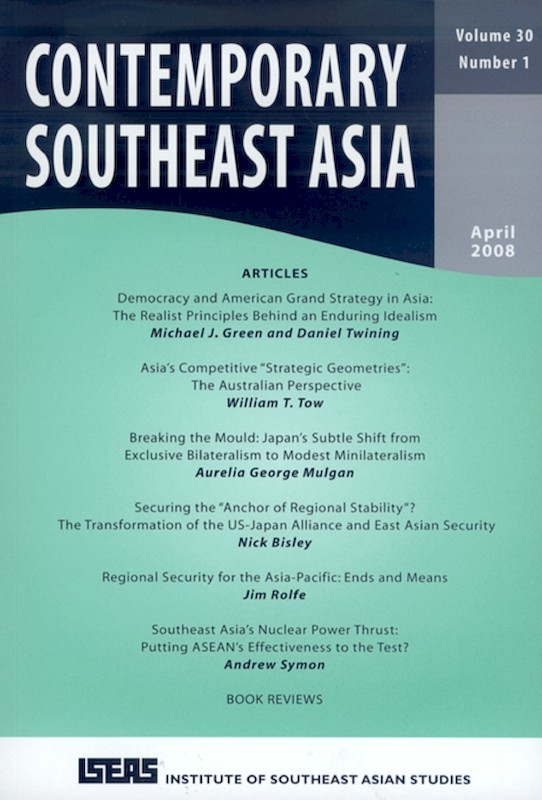Contemporary Southeast Asia Vol. 33/1 (Apr 2011)

Date of publication:
September 2011
Publisher:
Institute of Southeast Asian Studies
Number of pages:
156
Code:
CS33/1
Contents
-
Contemporary Southeast Asia Vol. 33/1 (Apr 2011)
[Whole Publication] -
Preliminary pages
- ARTICLES
-
Solving the "Wicked Problems" of Maritime Security: Are Regional Forums up to the Task?, by Sam Bateman, author see abstractMaritime security is a major concern in the Asia Pacific, yet is riddled with highly complex "wicked problems" that have thus far defied solution. These include different interpretations of the Law of the Sea underpinning regional maritime security, the lack of good order at sea, numerous conflicting claims to maritime jurisdiction, the implications of increased naval activity in the region and the lack of agreed maritime boundaries. This article identifies major wicked problems and reflects on the likelihood that they will be successfully addressed in regional forums. It finds some optimistic indications of a greater preparedness to address these issues than has been the case in the past. However, much will depend on whether existing mindsets can change to allow regional countries to corporate more effectively with regards to maritime security. The article concludes with the proposal that an Asian Peace Research Institute should be established to promote more independent thinking and greater cooperation.
-
Sub-Regional Cooperation and Developmental Regionalism: The Case of BIMP-EAGA, by Christopher M Dent, Peter Richter, authors see abstractThe Brunei-Indonesia-Malaysia-Philippines East ASEAN Growth Area (BIMP-EAGA) is one of a number of sub-regional "growth polygons" in Southeast Asia that was established in the early 1990s to help accelerate the process of regional integration among the member states of the Association of Southeast Asian Nations (ASEAN). However, these sub-regional zones include the less developed parts of Southeast Asia, and therefore face significant developmental challenges. This paper seeks to understand how BIMP-EAGA has addressed these challenges in accordance with the principles of developmental regionalism; that is, activities that are particularly oriented to enhancing the economic capacity and prospects of lesser-developed countries with a view to strengthening their integration into the regional economy, and thereby bringing greater coherence to overall regional community building. This article examines how BIMP-EAGA has pursued developmental regionalism through various initiatives and measures aimed at enhancing inter-related development capacities: technocratic, institutional, industrial, infrastructural, human and sustainable development. There have been successes but also failures in BIMP-EAGA, as evidenced by the persistent lack of progress in achieving substantial sub-regional development cooperation. This paper discusses the reasons for these outcomes, and makes a number of recommendations to give BIMP-EAGA new direction and purpose.
-
Meeting Targets, Missing People: The Energy Security Implications of the Sarawak Corridor of Renewable Energy (SCORE), by Benjamin K Sovacool, L.C. Bulan, authors see abstractThis article examines the energy security implications of the Sarawak Corridor of Renewable Energy in Malaysia (SCORE), a U.S.$105 billion infrastructure development plan in Sarawak on the island of Borneo. SCORE aims to build a series of hydroelectric dams along a 320-kilometre corridor by 2030. The article begins by explaining the methodology utilized for its research interviews and site visits. It goes on to argue that energy security in Southeast Asia should consist of simultaneously improving the availability, affordability, efficiency and stewardship of energy services for end users. Availability involves diversifying the fuels and technologies in energy production and minimizing dependence on imports; affordability means providing electricity and fuel within the income range of most consumers; efficiency means improving the performance of equipment and lowering demand for energy; and stewardship is minimizing political, social, and environmental hazards associated with energy production and consumption. The paper next introduces the SCORE project before making an assessment utilizing the four criteria of energy security. While SCORE partially improves availability, we argue that it erodes aspects of affordability, efficiency and stewardship. Cost overruns and delays in financing will make the electricity from SCORE suitable only to industrial users, not the energy poor. SCORE is predicated on the assumption that electricity demand should grow greatly in the future rather than the idea that energy efficiency and demand side management programmes should attempt to reduce growth in demand for electricity. Score also has a pernicious set of social, environmental and political consequences.
-
Southeast Asian Regionalism and Global Governance: "Multilateral Utility" or "Hedging Utility"?, by Jurgen Ruland, author see abstractRegional organizations are widely regarded as building blocks of a multilateral order. But this view ignores the fact that regional organizations vary in their contribution to multilateralism. This article therefore adds to Dent's established concept of "multilateral utility" the concept of "hedging utility" which I claim better captures the behaviour of many non-Western regional organizations including the Association of Southeast Asian Nations (ASEAN). In the theory-guided part the article develops six indicators to distinguish the two types of regional organizations: level of institutionalization, governance costs, nesting, agenda-setting, norm entrepreneurship and mode of interaction. Based on these categories, the article examines ASEAN's role as a contributor to a multilateral order. The findings illustrate that indeed "hedging utility" rather than "multilateral utility" better describes ASEAN's agency in shaping international order. The hedging concept resonates well with elite notions of Southeast Asian political culture and also captures the institutional balancing dimension of ASEAN's (security) policies.
-
Philippine Trade Policy and the Japan-Philippines Economic Partnership Agreement (JPEPA), by Edwin Van De Haar, author see abstractTaking the problematic ratification of the Japan-Philippines Economic Partnership Agreement (JPEPA) as a focal point, this article aims to determine the current state and future prospects of Philippine trade policy. Utilizing a multi-level approach, the motives and actions of the Philippines are analysed within the broader historical and socio-political framework of the country's trade policy. JPEPA was initiated by Tokyo and for both Japan and the Philippines it served important foreign policy goals, although the economic benefits for the latter were also substantial. The analysis shows that political institutions in the Philippines do not exert much influence on trade policy outcomes, the major exception being the office of the President. Domestic interests are far more important for Philippine trade policy. The analysis indicates that trade liberalization has hardly ever been an issue in Philippine politics, except in rare cases when it came to be foregrounded by a combination of incidental domestic political processes and initiatives of foreign powers such as Japan or regional organizations like ASEAN and APEC. The JPEPA case has reinforced the existing domestic trade policy gridlock, although external initiatives by foreign countries and regional organizations will remain of key importance for further trade liberalization in the Philippines.
- BOOK REVIEWS
-
BOOK REVIEW: Saying the Unsayable: Monarchy and Democracy in Thailand. Edited by Soren Ivarsson and Lotte Isager, by Patrick Jory, author
-
BOOK REVIEW: No Man's Land: Globalization, Territory, and Clandestine Groups in Southeast Asia. By Justin V. Hastings, by Kumar Ramakrishna, author
-
BOOK REVIEW: [Re]Negotiating East and Southeast Asia: Region, Regionalism and the Association of Southeast Asian Nations. By Alice D. Ba, by Deepak Nair, author
-
BOOK REVIEW: Beyond Democracy in Cambodia: Political Reconstruction in a Post-Conflict Society. Edited by Joakim Ojendal and Mona Lilja, by John Tully, author
-
BOOK REVIEW: Spiritual Economies: Islam, Globalization, and the Afterlife of Development. By Daromir Rudnyckyj, by Sunny Tanuwidjaja, author





